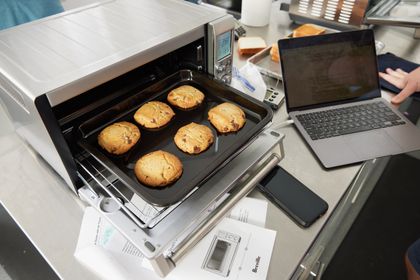The microwave is tempting, but any other method is better.
Prep: 2 mins
Cook: 10 mins
Total: 12 mins
Serving: 1
Yield: 1 slice
We either make or order pizza at least once a week in our house (no joke), and I am here to tell you that leftover pizza is a good problem to have. Banish any memories of sad, soggy day-old slices reheated in the microwave. I know all the tricks for coaxing your slices back to crispy-crusted, gooey-topped glory. Hint: you'll want to grab your favorite skillet for the crispiest crust.
Pizza Reheating Methods from Worst to Best
Over the years, I've tried reheating pizza pretty much every way you can imagine. Here is my short-list, from "meh" to "a-MAH-zing":
#4: The Microwave
I know, I know — I literally just told you to banish all memories of soggy microwaved pizza. But truthfully, if you need a warm slice of pizza pronto or you don't have access to the equipment needed for these other methods, the microwave is the way to go. If you have a paper towel handy, you don't even need a plate.
Is it the best? No. Does it get the job done? Yes.
- PROS: Quick and easy, super gooey cheese
- CONS: That crust is never going to get crispy, plus the outer crust tends to get hard and chewy as it cools.
- WHAT TO DO: Pop your slice on a plate or a paper towel and microwave on HIGH for 30 to 60 seconds, until the cheese is melted and the pizza is warmed through.
- BONUS TIP! Put a mug of water in the microwave next to your pizza. This helps the pizza heat more evenly and prevents the edges of the crust from hardening as the pizza cools.
#3: The Oven (or Toaster Oven!)
Oven-reheated pizza is nearly identical to fresh pizza, IMHO, and it's a great way to heat multiple pieces at once. The cheese and toppings get bubbly and hot while the bottom crust regains its original crispness. If you're working with delivery pizza, reheating it in the oven is arguably even better than it was when you got it. (In fact, if your delivery pizza arrives a little soggy, remove it from the box and pop the whole pizza in the oven to perk it back up again.)
The biggest demerit on this method, however, is definitely the time it takes to heat the oven (about 15 minutes) and then warm the slices (another 10 minutes). To me, this negates the convenience of having leftover pizza for dinner in the first place.
- PROS: Almost as good as fresh pizza; can heat multiple slices at once
- CONS: Takes extra time to heat the oven and then heat the pizza; thin-crust pizza can dry out
- WHAT TO DO: Preheat the oven to 350 F. Arrange your slices on a large piece of foil and place it directly on the middle rack. Bake for 8-10 minutes until the cheese is melted and the bottoms are golden and crisp. (If using a toaster oven, bake for 3 to 4 minutes.)
- BONUS TIP! Foil will give you the absolute crispiest crust, but a baking sheet works just fine too. Put the baking sheet in the oven while it's preheating and place the pizza slices directly on the hot pan, or place an oven-safe cooling rack over the sheet pan to lift the pizza off the pan's surface.
#2: The Air Fryer
If a crispy crust is our aim — which it definitely is — then why not turn to the kitchen appliance whose entire job is making foods crispy? I think the air fryer is especially good for reheating thin-crust pizza, which results in an almost cracker-like texture.
The only downsides are that you do need an air fryer, of course, which not everyone has. And second, you can usually only fit one triangular slice at a time in the air fryer, which is fine for a snack but less convenient when reheating dinner.
- PROS: Cracker-like crust and perfectly warmed toppings; super fast re-heating time
- CONS: Can often only heat one slice at a time.
- WHAT TO DO: Set your air fryer to 350F and cook for 2 to 4 minutes, until the cheese is melted and the bottom is crispy. (Cooking times vary by air fryer.)
#1: The Stovetop
For me, reheating on the stovetop is absolutely the way to go. It's the Goldilocks solution: fantastic crust and piping hot toppings plus the ability to heat several slices at once more quickly and conveniently than in the oven.
I've tried a few slightly different methods of reheating pizza on the stovetop, but what works for me is simply arranging the slices in a single layer, covering with a lid, and warming on medium until the bottoms are golden brown and the cheese is fully melted. You'll get slightly more crispiness if you use a cast iron pan, but truthfully, I've found that a stainless steel or even a nonstick pan works just as well.
- PROS: Easy and convenient; piping hot toppings and crispy brown underside
- CONS: Best if reheating dinner for one, otherwise you have to do several batches
- WHAT TO DO: Arrange the slices in a single layer in a skillet over medium heat. Cover with a lid and warm for about 5 minutes, until the cheese has melted and the bottom is crisp.
- BONUS TIP! Try warming the slices for a few minutes uncovered, then add a teaspoon or two of water to the side of the pan before covering until the cheese is fully melted. Some people swear by this variation for superior cheesiness.
Reheating pizza in a skillet on the stovetop is a great method, especially if you only have a slice or two and don't want to preheat the oven. Doing it this way retains the crispiness of the bottom crust while melting the cheese and heating the toppings all the way through.
To make leftover pizza taste almost as good as it did when the pie was fresh, you'll need to reheat it. You can choose the oven, stovetop, or microwave to warm up cold pizza, but it will likely depend on how much pizza you have left over and how quickly you want to eat. There is a solution for every scenario, though some methods produce better results than others.
Ingredients
-
1 slice pizza
Steps to Make It
Reheat Pizza in the Oven or Toaster Oven
-
Preheat the oven to 350 F. Place a sheet pan in the oven during preheating for a crisp crust.
-
Place the pizza on the hot sheet pan, if using, or on a piece of foil directly on the rack for even heating on the top and bottom.
-
Bake until warmed through and the cheese is melted, about 10 minutes. If you'd like your pizza crispier, bake for longer. Note that if you’re using a toaster oven, you’ll only need to heat the slice for 3 to 4 minutes.
Reheat Pizza on the Stovetop
-
Heat a large skillet over medium heat. Add the pizza slice and cook for a couple of minutes, uncovered.
-
On the side of the pan (not on the pizza), add a few drops of water, then immediately cover the pan with a lid. Cook the pizza until the cheese is melted and the pizza is heated through, about 3 minutes.
Reheat Pizza in the Microwave
-
Put the pizza slice on a plate in the microwave.
-
Next to the pizza, place a microwave-safe mug or cup of water. This serves as sort of a decoy, and will absorb some of the microwaves, allowing the pizza to heat up slightly more evenly so the cheese re-melts before the crust loses all of its moisture.
-
Heat on high until the cheese is melted and the pizza is heated through, 30 to 45 seconds. Keep a watchful eye on the pizza to check on the progress. You won't end up with the same crispiness of the oven or skillet.
Tips for Each Method
The Oven
- If you like a softer crust, add the pizza to an unheated sheet pan and place in the preheated oven. You can also use a pizza stone, but they take a long time to heat up, and the wait may not be worth it for just a few slices.
The Stovetop
- By adding a little water to the pan, then covering it, you’re creating a steamer that will ensure the toppings get hot, too.
- A cast-iron skillet is wonderful for this, but it takes a long time to heat up. A stainless steel skillet is perfectly fine, too.
The Microwave
- You can heat the pizza partially in the microwave and then finish it in a toaster oven for a crisp crust. This is an excellent technique for dorms and office kitchens when you don’t have access to an oven or stovetop.
| Nutrition Facts | |
|---|---|
| Servings: 1 | |
| Amount per serving | |
| Calories | 285 |
| % Daily Value* | |
| Total Fat 10g | 13% |
| Saturated Fat 5g | 24% |
| Cholesterol 18mg | 6% |
| Sodium 640mg | 28% |
| Total Carbohydrate 36g | 13% |
| Dietary Fiber 2g | 9% |
| Total Sugars 4g | |
| Protein 12g | |
| Vitamin C 1mg | 7% |
| Calcium 201mg | 15% |
| Iron 3mg | 15% |
| Potassium 184mg | 4% |
| *The % Daily Value (DV) tells you how much a nutrient in a food serving contributes to a daily diet. 2,000 calories a day is used for general nutrition advice. | |


